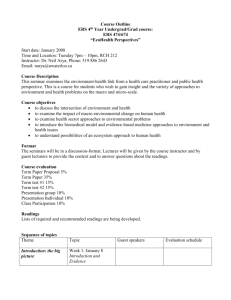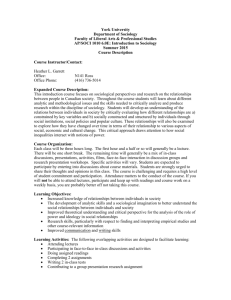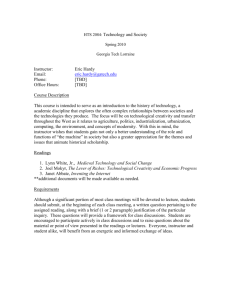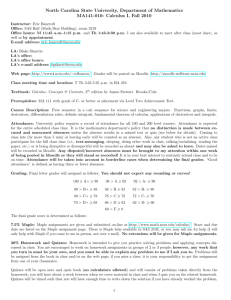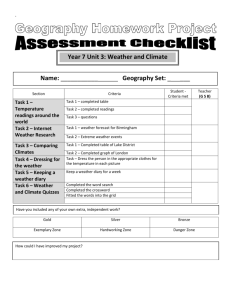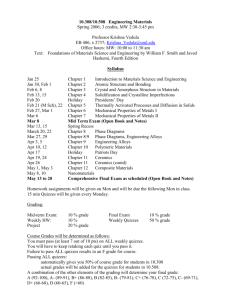Sociology 202 Principles of Sociology
advertisement
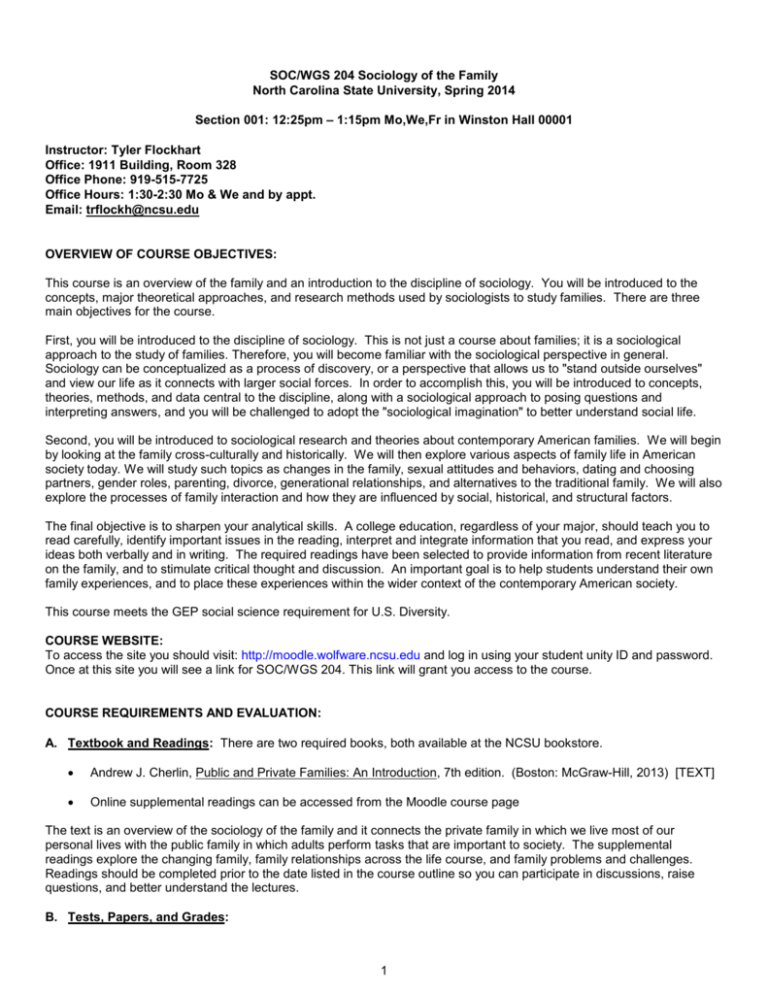
SOC/WGS 204 Sociology of the Family North Carolina State University, Spring 2014 Section 001: 12:25pm – 1:15pm Mo,We,Fr in Winston Hall 00001 Instructor: Tyler Flockhart Office: 1911 Building, Room 328 Office Phone: 919-515-7725 Office Hours: 1:30-2:30 Mo & We and by appt. Email: trflockh@ncsu.edu OVERVIEW OF COURSE OBJECTIVES: This course is an overview of the family and an introduction to the discipline of sociology. You will be introduced to the concepts, major theoretical approaches, and research methods used by sociologists to study families. There are three main objectives for the course. First, you will be introduced to the discipline of sociology. This is not just a course about families; it is a sociological approach to the study of families. Therefore, you will become familiar with the sociological perspective in general. Sociology can be conceptualized as a process of discovery, or a perspective that allows us to "stand outside ourselves" and view our life as it connects with larger social forces. In order to accomplish this, you will be introduced to concepts, theories, methods, and data central to the discipline, along with a sociological approach to posing questions and interpreting answers, and you will be challenged to adopt the "sociological imagination" to better understand social life. Second, you will be introduced to sociological research and theories about contemporary American families. We will begin by looking at the family cross-culturally and historically. We will then explore various aspects of family life in American society today. We will study such topics as changes in the family, sexual attitudes and behaviors, dating and choosing partners, gender roles, parenting, divorce, generational relationships, and alternatives to the traditional family. We will also explore the processes of family interaction and how they are influenced by social, historical, and structural factors. The final objective is to sharpen your analytical skills. A college education, regardless of your major, should teach you to read carefully, identify important issues in the reading, interpret and integrate information that you read, and express your ideas both verbally and in writing. The required readings have been selected to provide information from recent literature on the family, and to stimulate critical thought and discussion. An important goal is to help students understand their own family experiences, and to place these experiences within the wider context of the contemporary American society. This course meets the GEP social science requirement for U.S. Diversity. COURSE WEBSITE: To access the site you should visit: http://moodle.wolfware.ncsu.edu and log in using your student unity ID and password. Once at this site you will see a link for SOC/WGS 204. This link will grant you access to the course. COURSE REQUIREMENTS AND EVALUATION: A. Textbook and Readings: There are two required books, both available at the NCSU bookstore. Andrew J. Cherlin, Public and Private Families: An Introduction, 7th edition. (Boston: McGraw-Hill, 2013) [TEXT] Online supplemental readings can be accessed from the Moodle course page The text is an overview of the sociology of the family and it connects the private family in which we live most of our personal lives with the public family in which adults perform tasks that are important to society. The supplemental readings explore the changing family, family relationships across the life course, and family problems and challenges. Readings should be completed prior to the date listed in the course outline so you can participate in discussions, raise questions, and better understand the lectures. B. Tests, Papers, and Grades: 1 1. Tests: There will be four tests on the dates given below. Tests will consist of objective questions (multiple choice, matching). All tests are closed book and closed notes. Each test will count 15% of the course grade. 2. Article Presentation: Each student will be assigned one article from the supplemental readings to make an oral presentation to the class, and hand in a typed written summary and reaction of the article to me. Detailed instructions for the article presentation are on the Moodle site. Students will work in pairs for these presentations. Presentation dates correspond to the date the article is assigned in the course outline. Articles are presented by topic. For discussions to work well, all students should read every article. If you are absent on your assigned day, you will receive a "0" on the oral component of the article presentation, but may still receive credit for the written summary. The article presentation counts 20% of the course grade. 3. Film Questions and Quizzes: Students will be given film questions to hand in for films shown in class. These will be posted on Moodle. A few short quizzes may be given, either in class or on the Moodle site, to monitor and/or apply your understanding of the readings. Quizzes will be announced in advance; there will be no make-ups for in-class quizzes except for excused absences. Directions will be given for taking the Moodle quizzes. Collectively, the film questions and quizzes count 10% of the course grade. 4. Attendance: Per University regulations, excused absences must fall into one of two categories: sanctioned anticipated situations and documented emergency situations. Anticipated situations (e.g., participation in official University functions, court attendance, religious observances, or military duty) must be submitted in writing at the beginning of the semester or one week prior to the anticipated absence. Emergency absences (e.g., student illness, injury or death of immediate family member, must be documented by the Student Organization Resource Center 515-3323) within one week following the emergency. Make-up work will be allowed only in situations where absences were excused. Please consult the following website for further information on University attendance regulations: http://policies.ncsu.edu/regulation/reg-02-20-03 Regular attendance is expected of all students. Roll will be taken daily. You will not be counted as present if you: show up, but are not attentive (i.e., sleep, study for another class, etc.); show up late; OR leave early without prior permission. Lectures often contain material not found in the readings, so you should take notes during lectures. You are responsible for all material presented in class. Borrow notes from another student if you must be absent. Come prepared to participate in discussions, class activities and the readings. Changes in our schedule will be announced in class and posted on the Moodle web site. Attendance will count 10% of the course grade. 5. Final Exam: Test number 4 is the final exam. This exam will be given in the classroom at the time scheduled by the University. You must take the final exam at the scheduled time, so make holiday travel plans accordingly. The final exam will emphasize material covered after Test 3 and will consist of multiple choice and matching questions. Like the other exams, the final will count 15% of the course grade. 2 6. Course Grade: The final course grade is determined on a percentage basis by cumulating your weighted scores on all tests and papers. Final grades will be rounded to the nearest whole number (e.g., 89.5 rounds to 90.0, an A- and 89.4 rounds to 89.0, a B+). There is NO EXTRA CREDIT WORK--talk with me if you are having difficulty. 97-100% A+ 93-96% A 90-92% A- 87-89% B+ 83-86% B 80-82% B- Grading Scale 77-79% C+ 73-76% C 70-72% C- 67-69% D+ 63-66% D 60-62% DBelow 60% F 7. Make-up tests and late assignments: Make-up tests will be given only for documented, excused absences or emergencies. See me before missing an exam or due date. Requests for excused absences must be presented in writing and with proper documentation. Unexcused absences will result in a grade of "0". Late papers will be penalized, unless I grant an extension. Please discuss conflicts with me in advance. 8. Incomplete Grade Policy: Students will not be given a temporary grade of IN (incomplete) unless they have attended classes regularly for most of the semester, have completed at least 60% of required work, have missed required work as a result of factors beyond their control, and have submitted satisfactory documentary evidence. An IN grade not removed by the end of the next semester in which the student is enrolled or by the end of twelve months, whichever is earlier, will automatically become an F (unless the student can present a compelling, well-documented case for the extension). For the NC State policy on grading and IN grades, see http://policies.ncsu.edu/regulation/reg-02-50-03 9. Credit Only Policy: In order to receive a grade of S, students are required to take all exams and quizzes, complete all assignments, and earn a grade of C- or better. Credit-Only courses can only be included under the Free Elective category of the student’s curriculum. Conversion from letter grading to credit only (S/U) grading is subject to university deadlines. Refer to the Registration and Records calendar for deadlines related to grading. For more details refer to: http://policies.ncsu.edu/regulation/reg-02-20-15 C. Miscellaneous Information and Classroom Policies: 1. Academic Integrity: The NCSU Code of Academic Integrity is in effect for all tests, homework assignments, and papers. This code is exemplified in the Honor Pledge: “I have neither given nor received unauthorized aid on this test or assignment.” You are to work individually on all tests, homework assignments, and papers. You are to avoid any form of cheating including plagiarism. The minimum penalty for a student found guilty of academic misconduct will be a zero on the assignment and Academic Integrity Probation. More information about the Code of Student Conduct can be found at http://studentconduct.ncsu.edu/. 2. Students with Disabilities: Reasonable accommodations will be made for students with verifiable disabilities. In order to take advantage of available accommodations, students must register with Disability Services for Students at 1900 Student Health Center, Campus Box 7509, 515-7653. For more information on NC State's policy on working with students with disabilities, please see http://policies.ncsu.edu/regulation/reg-02-20-01 If you have any special academic or testing needs, please make an appointment with me so that we may work together to serve those needs. 3. Anti-Discrimination and Harassment Statement: NC State University provides equality of opportunity in education and employment for all students and employees. Accordingly, NC State affirms its commitment to maintain a work environment for all employees and an academic environment for all students that is free from all forms of discrimination. Discrimination based on race, color, religion, creed, sex, national origin, age, disability, veteran status, or sexual orientation is a violation of state and federal law and/or NC State University policy and will not be tolerated. Harassment of any person (either in the 3 form of quid pro quo or creation of a hostile environment) based on race, color, religion, creed, sex, national origin, age, disability, veteran status, or sexual orientation also is a violation of state and federal law and/or NC State University policy and will not be tolerated. Retaliation against any person who complains about discrimination is also prohibited. NC State’s policies and regulations covering discrimination, harassment, and retaliation may be accessed at http://policies.ncsu.edu/policy/pol-04-25-05 4. Evaluations: Students will complete an anonymous course/instructor evaluation. Online class evaluations will be available for students to complete during the last 2 weeks of fall and become unavailable before finals begin. Students will receive an email message directing them to a website where they can login using their Unity ID and complete evaluations. All evaluations are confidential; instructors will not know how any one student responded to any question, and students will not know the ratings for any instructors. Evaluation website: https://classeval.ncsu.edu/ 5. Adverse Weather Policy: I will contact the Sociology department if class is canceled and you will be notified through Moodle and/or by e-mail, using the e-mail address you have on file with Registrations and Records. 6. Cell Phones and Laptops: All cell phones are to be silent during class, and are not to be used for texting or other purposes. No cell phones are permitted on your desk during tests and exams. Laptops are permitted in class for note-taking purposes only (please refrain from checking email, facebook, surfing the web, etc. during class). If the use of your laptop is distracting to you or other students, laptops will not be allowed to be used during class. 7. CHASS career development services: The University Career Center includes services exclusively for CHASS majors. Sara Concini (serving last name initials A-H) and Woody Catoe (I-Z) are your career development contacts. Appointments can be made online or you may call the center at 919-515-2396 for assistance. Check out the extensive web site at www.ncsu.edu/career. Be sure to sign up for ePack to learn about internships, jobs, and career events and to use the online appointment service. The center is located in 2100 Pullen Hall, with parking available in the Dan Allen deck. COURSE OUTLINE AND ASSIGNMENT SCHEDULE: [Instructor reserves the right to make changes to the reading schedule at his discretion] DATE READING ASSIGNMENTS LECTURE TOPIC / ARTICLE PRESENTATIONS PART I: PERSPECTIVES ON THE FAMILY: THEORETICAL, HISTORICAL, CROSS-CULTURAL Jan. 6 Introduction to the course Review syllabus and course expectations. Lecture: What is sociology? Sociological Imagination Jan. 8 TEXT Chapter 1 pp. 4-17 What is a family? Public and Private Families Jan. 10 What is a family? Public and Private Families TEXT Chapter 1 pp. 4-17 SUPPLAMENTAL READING: Introduction SUPPLAMENTAL ARTICLE: The Deinstitutionalization of American Marriage Jan 13 TEXT chapter 1 pp. 17-22 Research methods and ethical issues 4 Jan. 15 TEXT chapter 1 pp. 22-36 Sociological Theories and the family Jan. 17 TEXT Chapter 2 The history of the family Jan. 20 NO CLASS: MLK DAY Jan. 22 The history of the family TEXT Chapter 2 SUPPLAMENTAL READING: What’s Love Got to Do with It? A Brief History of Marriage Jan 24 TEXT Chapter 3 Jan 27 Gender and families TEXT Chapter 3 SUPPLAMENTAL ARTICLE: Doing Gender Jan 29 Review Readings on Gender Gender and families/Film: Tough Guise Jan. 31 NO Readings Gender and families Finish Tough Guise and review for Test Feb. 3 TEST 1 TEXT Chapters 1-3; SUPPLAMENTAL ARTICLES/ Film Feb. 5 TEXT Chapter 4 Social class and families PART II: FAMILY VARIATIONS: SOCIAL CLASS, RACE, AND ETHNICITY Feb 7 TEXT Chapter 4 Social class and families SUPPLAMENTAL ARTICLE: Blue-Collar Blues/White Collar Weddings Feb. 10 Review readings on Social Class Film: Wage Slaves Feb. 12 Review readings on Social Class Finish Wage Slaves/ Class Discussion on Film 5 Feb. 14 TEXT Chapter 5 pp. 140-147 Racial-ethnic families and immigration; Asian-American families; American Indian families & pp. 163-167 Review TEXT Chapter 2 pp. 58-59 & 45-46 SUPPLAMENTAL ARTICLE: Conflict, Coping, and Reconciliation: Intergenerational Relations in Chinese Immigrant Families Feb 17 Text Chapter 5 pp. 147-162; African-American families; Hispanic families 167-173 Review TEXT Chapter 2 pp. 53-58 SUPPLAMENTAL ARTICLE: Why Won’t African Americans Get (and Stay) Married? Why Should They? Feb 19 TEXT Chapter 5 Finish chapter 5 material PART III: LOVE, SEXUALITY, DATING, PARTNERSHIP AND MARRIAGE Feb 21 TEXT Chapter 6 pp 178-195 Sexual identities Feb 24 TEXT Chapter 6 pp. 195-205 Trends in marital and nonmariatal sexual attitudes and behavior; adolescent sexuality and pregnancy Feb 26 SUPPLAMENTAL ARTICLES: Sexual Desire and Gender; Is Hooking Up Bad for Women? Hooking up; Sexual desire among women and men Feb 28 TEST 2 TEXT Chapters 4-6; SUPPLAMENTAL Articles Mar. 3 TEXT Chapter 7 Courtship, dating, and partner selection; Cohabitation Supplemental Article: Everything’s There Except Money: How Money Shapes Decisions to Marry among Cohabitors Mar. 5 TEXT Chapter 7 Marriage, types of relationships, adjustments, and satisfaction SUPPLAMENTAL ARTICLE: Grounds for Marriage: How Relationships Succeed or 6 Fail Mar 7 TEXT CHAPTER 7 Finish chapter 7 Mar 10 SPRING BREAK; NO CLASS! Mar 12 SPRING BREAK; NO CLASS! Mar 14 SPRING BREAK; NO CLASS! Mar 17 TEXT Chapter 8 Mar 19 Work and family: issues and conflicts TEXT Chapter 8 SUPPLAMENTAL ARTICLE: The Second Shift: Working Parents and the Revolution at Home Work and family: issues and conflicts PART V: LINKS ACROSS THE GENERATIONS Mar 21 TEXT Chapter 9 pp. 273-285 Parenthood: the transition to parenthood, adoption, unmarried with SUPPLAMENTAL ARTICLE: children, child care New Families: Modern Couples as New Pioneers Mar 24 TEXT Chapter 9 pp. 285-302 Childhood, youth, and sibling relationships SUPPLAMENTAL ARTICLE: Unequal Childhoods: Class, Race, and Family Life Mar 26 Catch up/Review day Mar 28 TEST 3 Mar31 TEXT Chapter 10 TEXT Chapters 7-9; Supplemental Readings The elderly and their families Apr 2 TEXT Chapter 10 The elderly and their families ARTICLE: Men and Women: Together and Apart in the Later Years 7 PART V: CONFLICT, DISRUPTION AND RECONSTITUTION Apr 4 TEXT Chapter 11 Domestic Violence Apr 7 TEXT Chapter 11 Domestic Violence ARTICLE: Controversies Surrounding Mandatory Arrest Policies and the Police Response to Intimate Partner Violence Apr 9 TEXT Chapter 12 Divorce: trends, causes, stages and processes Apr11 TEXT Chapter 12 ARTICLE: Children’s Adjustment Following Divorce: Risk and Resilience Perspectives Divorce: trends, causes, stages and processes Apr14 TEXT Chapter 13 Remarriage and Stepfamilies Apr16 TEXT Chapter 13 ARTICLE: The Modern American Stepfamily: Problems and Possibilities Remarriage and Stepfamilies PART VI: FAMILY, SOCIAL POLICY AND SOCIETY Apr18 SPRING HOLIDAY; NO CLASS! Apr21 TEXT Chapter 14 The family, the state, and social policy; public debates and private lives Apr23 TEXT Chapter 14 ARTICLE: Gay Marriage, Same-Sex Parenting, and America’s Children The family, the state, and social policy; public debates and private lives Apr25 READING DAY; NO CLASS May 2 FINAL EXAM (1:00pm4:00pm) Text Chapters 10-14; and supplemental articles 8
